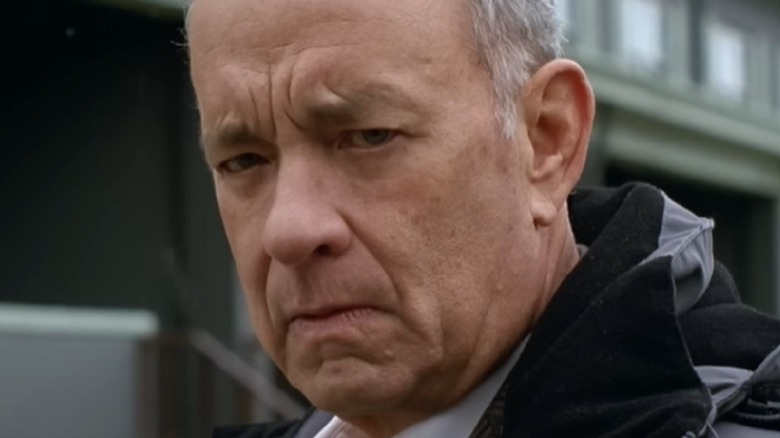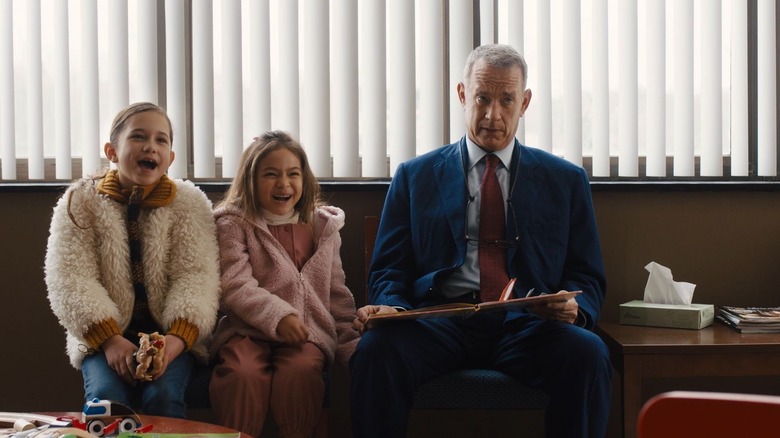A Man Called Otto Review: A Movie Called Underwhelming
- Some excellent dark comedy amidst the sweetness
- Surprisingly effective trans representation - a rarity for a studio movie aimed at older audiences.
- Far more sentimental than the original adaptation, to the detriment of the pitch-black humor
- Casting Tom Hanks against type as the grumpy lead is less powerful than casting a more gruff older actor. This would have been a perfect Clint Eastwood or Harrison Ford role!
Tom Hanks' reputation as America's dad has been carefully forged through years of roles as the heroic everyman, but we're now arriving at an interesting period in his career where he wants to start challenging that screen persona more. It's not that we've never seen him play less empathetic characters on screen before, cast against type in films ranging from "A League of Their Own" to "Road to Perdition," but these have been few and far between — performances that remind you of his underrated range as an actor before he settles back into his movie star comfort zone.
It almost feels like playing Mr. Rogers in "A Beautiful Day in the Neighborhood" was a turning point, so perfectly cast in director Marielle Heller's biopic (and earning his first Oscar nomination in nearly 20 years for it) that his logical response was to stray as far away from the paternal familiarity that has made him beloved by millions. His turn as the monstrous Colonel Tom Parker in "Elvis" showed him embracing the idea of being a larger-than-life villain unlike ever before, often feeling like an odd companion piece to that 2019 film; whereas Fred Rogers was depicted as a surrogate father for all who encountered him, Elvis Presley's manager was the cynical figure whose care for his pseudo-son began and ended with the profits he made.
"A Man Called Otto" aims to go even further in its subversion of Hanks' persona, offering a less-than-idealized depiction of an American father whose cantankerousness stands apart from the hopeful humanism in many of the actor's most beloved roles.
At its best when it's at its grumpiest
Tom Hanks' choice to both produce and star in "A Man Called Otto" only furthers the sense that subverting audience expectations of a typical Tom Hanks role was one of the key factors in making this passion project. And yet, as we see the grumpy Otto slowly find new meaning within a life overshadowed by grief, the trajectory is every bit as melodramatic as many a Hanks vehicle before it, even if the character stands out amongst the majority of his filmography. This isn't a problem in and of itself, but it means the character arc is less rewarding than if an actor more suited to this gruff screen archetype played the role. Rather than showcasing Hanks' versatility, I just left confused as to why a role tailor-made for an actor of the Clint Eastwood or Harrison Ford variety has been played by the nicest man in Hollywood, rather than a performer who could make the whole affair less easily sentimental. It's a rare example of a film where casting the lead towards type rather than against it could have yielded more powerful results.
Adapted from Fredrik Backman's 2012 novel "A Man Called Ove," which was previously adapted in Swedish and nominated for two Academy Awards in 2017, Hanks stars as widower Otto, who has nothing but contempt for those around him. Shortly after choosing to retire from his job of 40 years after employees he trained got promotions to senior positions above him, he makes the decision to end his life — although each attempt is thwarted by terrible planning and unlucky coincidences that give the film a dose of offbeat dark comedy it's otherwise lacking. The previous Swedish adaptation of this story was similarly melancholic but never compromised on the gallows humor. This hasn't entirely gotten lost in translation, even if the film as a whole is as syrupy sweet as you'd expect from a Hollywood adaptation of a moody Scandinavian bestseller, making its diversions into jet-black humor all the more welcome (even if they are less fitting with this film's overall tone than in the previous adaptation).
Very familiar -- apart from one refreshing subplot
The film is at its strongest during this opening stretch, when it's at its furthest from being a feel-good movie, introducing the title character berating hardware store employees because he's unable to buy the specific length of rope he wants. There's an initial irreverence to how it treats Otto's mental state that feels surprisingly reflective of how many of us who have struggled with depression view the world at our lowest moments — more frustrated by it than depressed, which is a refreshingly honest depiction that lasts until we start flashing back to how Otto first met his wife, and the whole film takes a left-turn into solemnity. From there, we fall into narrative predictability, as Otto looks back at his past to develop deeper bonds within the present, becoming more beloved in the community after helping to save someone's life after they fall on the train tracks, ruining another of his planned suicide attempts. For all of its inherent darkness, director Marc Foster has made a film that wears its crowd-pleasing earnestness on its sleeve, even if it never marries the uplift with the grit quite as successfully as the classic Frank Capra movies it's noticeably inspired by.
With Otto's contempt for the modern world, from supposedly work-shy Millennials and influencers to people who put their garbage in the wrong recycling bin, it would initially be easy to read him as a more closed-minded, conservative character than what we typically expect to see Hanks play. It's no surprise that the film slowly unveils his affinity to the world around him, but there is one refreshing aspect within this expected trajectory, which deviates slightly from the source material. In the Swedish film, the character of Ove bonded with a teen who had just come out as gay, welcoming him into his home after his father disapproved — here, this has been changed into a trans character estranged from his father after coming out as a man. The broad strokes of how this narrative plays out remain the same as in the previous adaptation, but it nevertheless feels refreshing to have an empathetic, substantial supporting appearance from an openly transgender character in a film primarily targeted at old audiences; it's the one area where the overall moral of learning to embrace those around us feels necessary.
On the whole, "A Man Called Otto" is exactly the film you expect it to be, regardless of how familiar you are with the original novel or the previous film adaptation. It'll likely charm older audiences, even if the film is at its strongest when it's at its meanest — the more it begins to resemble a conventional Tom Hanks vehicle, the less dramatically satisfying it becomes.
"A Man Called Otto" hits theaters on Friday, December 30.
If you or anyone you know is having suicidal thoughts, please call the National Suicide Prevention Lifeline by dialing 988 or by calling 1-800-273-TALK (8255).


